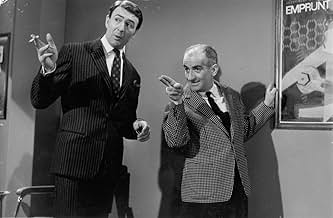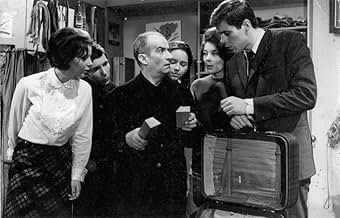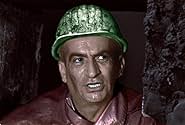Faites sauter la banque!
- 1964
- 1h 28min
NOTE IMDb
6,7/10
2,7 k
MA NOTE
Un commerçant grincheux a fait un investissement financier infructueux, et se trouve maintenant au bord de la faillite. Afin de se venger, il engage sa propre famille dans un projet de braqu... Tout lireUn commerçant grincheux a fait un investissement financier infructueux, et se trouve maintenant au bord de la faillite. Afin de se venger, il engage sa propre famille dans un projet de braquage d'une banque voisine.Un commerçant grincheux a fait un investissement financier infructueux, et se trouve maintenant au bord de la faillite. Afin de se venger, il engage sa propre famille dans un projet de braquage d'une banque voisine.
Nicole Chollet
- La cliente
- (as Nicole Cholet)
André Badin
- Un habitant du quartier
- (as Badin)
Histoire
Le saviez-vous
- AnecdotesFinal film of Yvonne Rozille.
- Versions alternativesAlso available in a computer colorized version.
- ConnexionsReferenced in Pastewka: Der Unfall (2005)
Commentaire à la une
"Let's Rob a Bank" might not be among Louis de Funes' Top 20 comedies (not even by the numbers) but who cares? The film is obviously one of the last steps back before the big dive into stardom, a minor but charming companion piece to "Pouic-Pouic", also directed by Jean Girault, written by Jacques Vilfrid and composed of the same plot elements, mixing family, financial misunderstanding and vaudeville-like misunderstandings. De Funès plays Mr. Victor Garnier, the owner of an equipment store for fishing and hunting who's suffered a big financial loss because he was ill-advised by his banker played by Jean-Pierre Marielle. How does he contemplate vengeance? Simply by digging a tunnel to steal bulions from the safe.
Within its silly premise, the film has a little unpretentious charm of its own. And I suspect it was shot earlier than 1964 and from the little crop of hair remaining on Fufu's head and their shades of black, I guess he still had to age a little physically. Still, he was at the top of his game here, surrounded by a family that feels more like sparring-partners to his eternal tantrums. The cast isn't as memorable as "Pouic Pouic" where he had to act along Jacqueline Maillan, Christian Marin and Mireille Darc. Here the faces are relatively unknown (Yvonne Clech and Anne Doat aren't exactly household names) Doat is cute enough to catch the eyes of the young bank clerk (Jean Valmont) and form the obligatory beta couple. Clech doesn't have the comical timing of Maillan, nor the imperial elegance of Claude Gensac and the son (Michel Tureau) looks too old for the part.
In fact, it's the little nerdy daughter who saves the day and has that precocious quality that reminded me of the little sister in Hitchcock's "Shadow of a Doubt" she's played by Catherine Demongeot who was little Zazie in Louis Malle's film and she'd grown so much she was almost the same height than her father. In fact, the second big cast member is Jean-Pierre Marielle who's almost totally unrecognizable. The first time I saw the film 25 years ago, I couldn't associate that suave and debonair smooth-talking man in black suit (with hair) to the mustached bald guy who was harassed by Jean-Paul Belmondo in "Hold-Up" although his voice was unmistakable.
Now, there's something about De Funès confronting a man one foot taller that never gets old, and from the way he interacts with them, you could tell he was practicing his last comical quips. There's also a great moment where he confronts a policeman played by George Wilson and that foreshadows the keen eye he will always display with his subordinates or superiors, bluffing his way out of uncomfortable situations.
In fact, the film is mostly memorable for watching Funès interacting, shortening himself even more to get away from tricky moments or 'playing dumb' with people dumber than him like that interesting conversation with Jean Lefebvre. Speaking of Lefebvre (who co-starred the same year in the first "Gendarme") the film is also a little who's-who of all the character actors of that time Jean Droze, Philippe Dumat and Claude Piéplu. Some less inspired parts that can look as obvious fillers such as the unnecessary interventions of Belgian relatives giving the film the appeal of a little sitcom.
Still, Jean Girault makes it a great vehicle for De Funès and Marielle. It's obvious that it was made with a shoestring budget and wasn't meant to be a huge box office but it proved itself to be effective. I guess Girault understood that the 'family man' thing worked but there had to be a little more in the narrative territory to allow De Funès to express his comedic talent to the fullest. That 'little more' came the same year with the first 'Gendarme' film.
Within its silly premise, the film has a little unpretentious charm of its own. And I suspect it was shot earlier than 1964 and from the little crop of hair remaining on Fufu's head and their shades of black, I guess he still had to age a little physically. Still, he was at the top of his game here, surrounded by a family that feels more like sparring-partners to his eternal tantrums. The cast isn't as memorable as "Pouic Pouic" where he had to act along Jacqueline Maillan, Christian Marin and Mireille Darc. Here the faces are relatively unknown (Yvonne Clech and Anne Doat aren't exactly household names) Doat is cute enough to catch the eyes of the young bank clerk (Jean Valmont) and form the obligatory beta couple. Clech doesn't have the comical timing of Maillan, nor the imperial elegance of Claude Gensac and the son (Michel Tureau) looks too old for the part.
In fact, it's the little nerdy daughter who saves the day and has that precocious quality that reminded me of the little sister in Hitchcock's "Shadow of a Doubt" she's played by Catherine Demongeot who was little Zazie in Louis Malle's film and she'd grown so much she was almost the same height than her father. In fact, the second big cast member is Jean-Pierre Marielle who's almost totally unrecognizable. The first time I saw the film 25 years ago, I couldn't associate that suave and debonair smooth-talking man in black suit (with hair) to the mustached bald guy who was harassed by Jean-Paul Belmondo in "Hold-Up" although his voice was unmistakable.
Now, there's something about De Funès confronting a man one foot taller that never gets old, and from the way he interacts with them, you could tell he was practicing his last comical quips. There's also a great moment where he confronts a policeman played by George Wilson and that foreshadows the keen eye he will always display with his subordinates or superiors, bluffing his way out of uncomfortable situations.
In fact, the film is mostly memorable for watching Funès interacting, shortening himself even more to get away from tricky moments or 'playing dumb' with people dumber than him like that interesting conversation with Jean Lefebvre. Speaking of Lefebvre (who co-starred the same year in the first "Gendarme") the film is also a little who's-who of all the character actors of that time Jean Droze, Philippe Dumat and Claude Piéplu. Some less inspired parts that can look as obvious fillers such as the unnecessary interventions of Belgian relatives giving the film the appeal of a little sitcom.
Still, Jean Girault makes it a great vehicle for De Funès and Marielle. It's obvious that it was made with a shoestring budget and wasn't meant to be a huge box office but it proved itself to be effective. I guess Girault understood that the 'family man' thing worked but there had to be a little more in the narrative territory to allow De Funès to express his comedic talent to the fullest. That 'little more' came the same year with the first 'Gendarme' film.
- ElMaruecan82
- 29 mai 2022
- Permalien
Meilleurs choix
Connectez-vous pour évaluer et suivre la liste de favoris afin de recevoir des recommandations personnalisées
- How long is Let's Rob the Bank?Alimenté par Alexa
Détails
- Durée1 heure 28 minutes
- Couleur
- Rapport de forme
- 1.66 : 1
Contribuer à cette page
Suggérer une modification ou ajouter du contenu manquant

Lacune principale
By what name was Faites sauter la banque! (1964) officially released in India in English?
Répondre



























